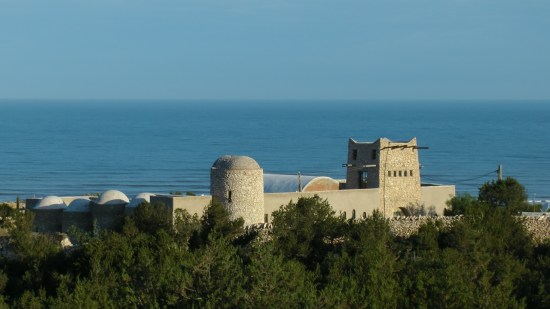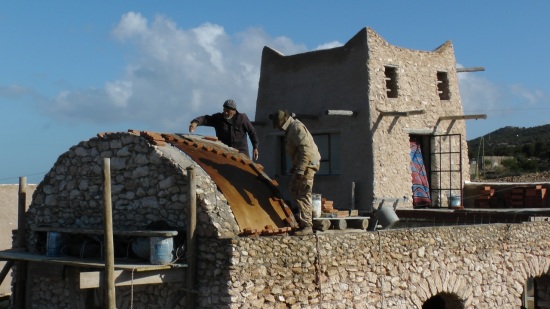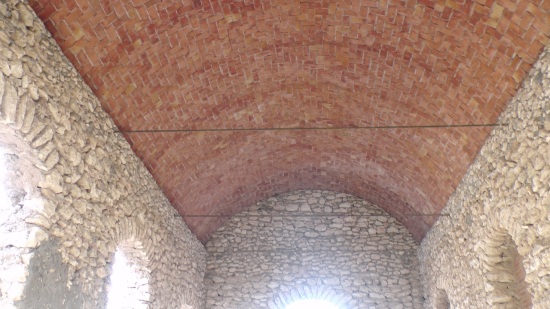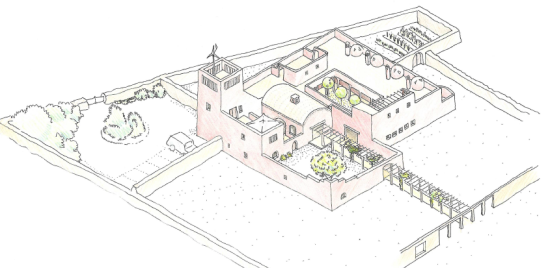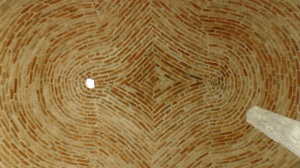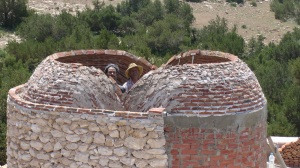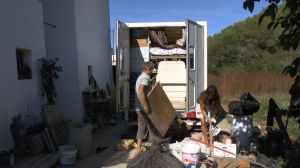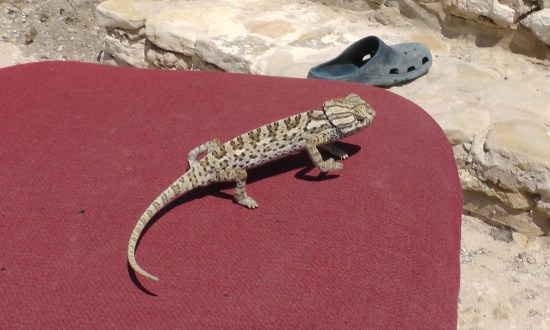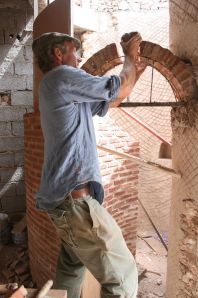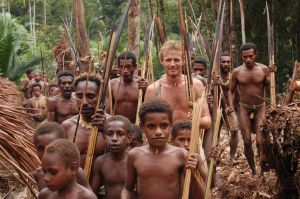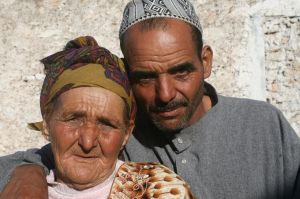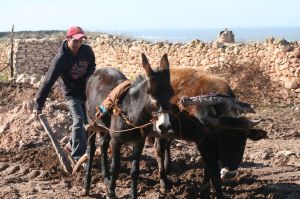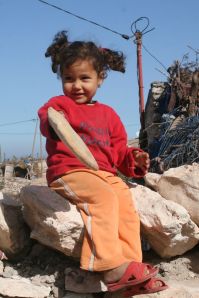I have to admit to a small crisis of confidence when I arrived at the Serai last week. After a particularly hot summer and now with a howling wind tearing at the plastic bags, les fleurs de Maroc, fluttering from almost every tree, the place was looking at its worst. The water pump had packed up in April and all our carefully planted trees and shrubs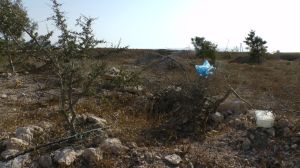 appeared shrivelled, abandoned and barely alive. There was a fan of rubbish sprayed out from our neighbour, Hafed’s wall as if he had just tossed it all up into the wind. Opening the house I found everything thick with dust and gecko shit and for half an hour or so I felt paralysed and quite unable to start making it habitable. It’s the first time since 2008 I’ve been here at this time of year, near the end of the dry season, and the scale and possible lunacy of the project I am planning was suddenly thrown into very sharp relief. I sat on the doorstep and stared out to the ocean across the parched land and thought I must be mad.
appeared shrivelled, abandoned and barely alive. There was a fan of rubbish sprayed out from our neighbour, Hafed’s wall as if he had just tossed it all up into the wind. Opening the house I found everything thick with dust and gecko shit and for half an hour or so I felt paralysed and quite unable to start making it habitable. It’s the first time since 2008 I’ve been here at this time of year, near the end of the dry season, and the scale and possible lunacy of the project I am planning was suddenly thrown into very sharp relief. I sat on the doorstep and stared out to the ocean across the parched land and thought I must be mad.
A couple of hours later, waiting for the vacuum cleaner to cool down again, I went outside to fetch in some furniture and found a chameleon sitting on my office chair. It was the first time I’d ever seen one in the garden but it was the symbolism of the chair that struck me most. I have been a little chameleon-like myself in some ways and that this extraordinary little creature had so incongruously positioned itself seemed to be telling me that this indeed was my place, at that desk, making it all work.
I’m not overly susceptible to ‘signs’ but this place has been unusually thick with them over the years. In the 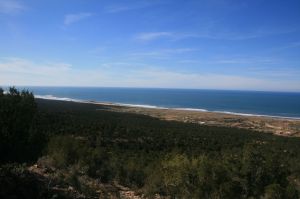 first place, it was a string of coincidences that persuaded me to take an enormous leap of faith in buying the land without ever having set foot on Moroccan soil. These were followed by the revelation that Ayelen, and this is the most bizarre of all, quite independently and before we were a couple, had chosen the exact same little patch of coastline to be interested in, in terms of buying land. There have been others too and it’s always felt solidly right that we are here.
first place, it was a string of coincidences that persuaded me to take an enormous leap of faith in buying the land without ever having set foot on Moroccan soil. These were followed by the revelation that Ayelen, and this is the most bizarre of all, quite independently and before we were a couple, had chosen the exact same little patch of coastline to be interested in, in terms of buying land. There have been others too and it’s always felt solidly right that we are here.
I carried my little visitor deep into the forest and we eyeballed one another quizzically en route. She, or he, was very calm, two little mitten-like hands gripping my forefinger. When I returned to the house I was in an entirely different frame of mind. This project was the right thing to do, for a multitude of reasons, and the people would go for it.
For weeks now I’ve been going over in my head what I wanted to say to them. How was I going to portray my plan so that they were persuaded to try it without thinking that a free meal ticket was on its way? How was I going to turn generations of thinking on its head? My grasp of Arabic is still feeble so, for a start, I would need a good interpreter with me, and one 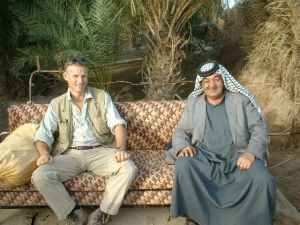 whose own enthusiasm I could inspire before we even went in. I’ve worked with many interpreters in the past and it’s been a mixed experience. One or two have almost got me killed. Others have made up for my own failings in understanding a cultural nuance or three. Watching closely for the changes of expression in my audience has generally been the surefire way of knowing the value of the man at my side, but working with a new interpreter can be nerve wracking. What’s the point of rehearsing the persuasive subtelties of what I might say when it’s another who’s going to say it, and when I’m going to have little clue as to how he’s conveyed it? But a way around this, of course, is to keep everything very simple and have as many visual aids as possible. To this end I scour the internet for days.
whose own enthusiasm I could inspire before we even went in. I’ve worked with many interpreters in the past and it’s been a mixed experience. One or two have almost got me killed. Others have made up for my own failings in understanding a cultural nuance or three. Watching closely for the changes of expression in my audience has generally been the surefire way of knowing the value of the man at my side, but working with a new interpreter can be nerve wracking. What’s the point of rehearsing the persuasive subtelties of what I might say when it’s another who’s going to say it, and when I’m going to have little clue as to how he’s conveyed it? But a way around this, of course, is to keep everything very simple and have as many visual aids as possible. To this end I scour the internet for days.
There’s a lot of permaculture stuff on the net but the vast majority shows people playing around in temperate and sub-tropical climates, with fat cattle browsing amidst lush, broad-leafed vegetation. If I showed even a few seconds of that they’d think I was a deluded idiot. In the end there’s only really some before and after photographs I can use, some cartoon graphics, and parts of a well-known Youtube film series entitled ‘Greening the Desert‘. Part 1 appears to have been made as an afterthought. It’s not a film at all, but a slideshow with voiceover. It has a powerful message, however, and the fact that it documents a salted landscape with less than half the rainfall we get here, no decent catchment, and much higher summer temperatures, is gold dust. I fill in any gaps with my own badly drawn renditions of what we might do to harvest rainfall and a selection of permaculture oddities, such as a ‘chicken tractor’. You’ll have to look it up.
Six hours before my presentation I go into town to meet my team. I don’t know them from Adam but they all come highly recommended and none of those I initially had in mind are available. Rachid (left) will interpret and has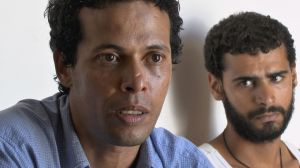 worked for friends in setting up a local charity. Two friends of his: Kim (not pictured), from Germany and Fouad (right) have volunteered to film the event. They are all young, well informed, tech savvy and speak perfect English. I have a friend drop us off in the forest at the top of the escarpment and we walk down towards the ocean together. By the time we arrive at the Serai I know they are all going to be great. The only concern left is how many of the locals will turn up?
worked for friends in setting up a local charity. Two friends of his: Kim (not pictured), from Germany and Fouad (right) have volunteered to film the event. They are all young, well informed, tech savvy and speak perfect English. I have a friend drop us off in the forest at the top of the escarpment and we walk down towards the ocean together. By the time we arrive at the Serai I know they are all going to be great. The only concern left is how many of the locals will turn up?
For several days now, two lads, Abdullah and Khalid, have been going around the two communities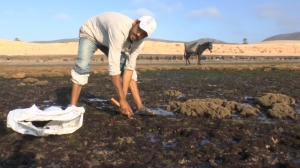 encouraging everyone to come, but I know it’ll take time for people to gather. Inside Hassan’s windowless house the atmosphere is stifling and for an hour there’s nobody but him and a younger man called Hussein. Many are down at the beach harvesting seaweed that will end up as the agar in laboratory petri-dishes and it actually gives me a useful hour of quiet discussion. I want to understand what it is they really want. What does Hassan dream of for his grandchildren? What would they do for more money if only there was more water?
encouraging everyone to come, but I know it’ll take time for people to gather. Inside Hassan’s windowless house the atmosphere is stifling and for an hour there’s nobody but him and a younger man called Hussein. Many are down at the beach harvesting seaweed that will end up as the agar in laboratory petri-dishes and it actually gives me a useful hour of quiet discussion. I want to understand what it is they really want. What does Hassan dream of for his grandchildren? What would they do for more money if only there was more water?
They talk openly of abandoning the land. They have heard on the news that the Government plans to allocate this part of the coast to a new system of marine reserves and they think that this will prevent them from collecting the seaweed. If so, it’s yet another income stream that’s denuded or closed off altogether. Many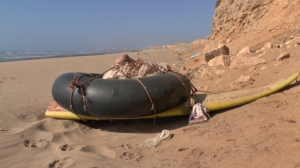 here have hardly any land and make their living almost entirely from the beach. They have nowhere to keep a boat so they go out to sea in old truck inner tubes lashed to broken surf boards, through the crashing waves to lay nets beyond. Or, when the ocean swell is less, as it is at this time of year, they collect the weed from above and below the low water mark. The fishing isn’t good anymore. These days there are just too many boats coming out of Essaouira to comb the waters just beyond their nets, and over the horizon are the larger international fleets. For those without livestock the writing is on the wall. Already many families have left for the town. The diminishing rainfall and poor soil supports only wheat, peas, onions and potatoes and hardly enough of those to pay for the next batch of fertiliser. My timing could not be more fortuitous.
here have hardly any land and make their living almost entirely from the beach. They have nowhere to keep a boat so they go out to sea in old truck inner tubes lashed to broken surf boards, through the crashing waves to lay nets beyond. Or, when the ocean swell is less, as it is at this time of year, they collect the weed from above and below the low water mark. The fishing isn’t good anymore. These days there are just too many boats coming out of Essaouira to comb the waters just beyond their nets, and over the horizon are the larger international fleets. For those without livestock the writing is on the wall. Already many families have left for the town. The diminishing rainfall and poor soil supports only wheat, peas, onions and potatoes and hardly enough of those to pay for the next batch of fertiliser. My timing could not be more fortuitous.
The room fills slowly and with too many children. There are no women, of course. I did venture the possibility 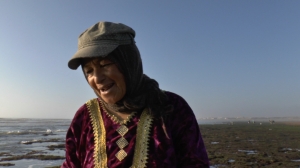 that some of the older ones, the matriarchs, might attend but even this was met with derision. Khadija (left), whose house this is, only gestures from the doorway, at one point, that someone must pour the tea if we are to drink it. It’s frustrating that half the room must be taken up with disinterested boys while the one group that I could really rely upon to push this idea along are denied entry. I’m still missing some of the key men too, however all but a few of the families are represented, so off we go.
that some of the older ones, the matriarchs, might attend but even this was met with derision. Khadija (left), whose house this is, only gestures from the doorway, at one point, that someone must pour the tea if we are to drink it. It’s frustrating that half the room must be taken up with disinterested boys while the one group that I could really rely upon to push this idea along are denied entry. I’m still missing some of the key men too, however all but a few of the families are represented, so off we go.
Very slowly and methodically I take them through a potted history and the basics of permaculture and 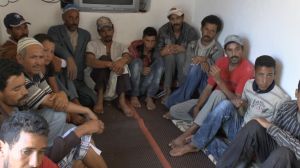 holistically managed grazing. Even watching the film clips is a halting process, as almost every scene requires explanation as well as translation. Fouad and Kim film the reactions, which vary from Hassan’s growing excitement to the unshakeable boredom of the boys lined up along one wall. I couldn’t care less about the latter but Hassan’s enthusiasm is vital; he is the unofficial spokesman of the two communities.
holistically managed grazing. Even watching the film clips is a halting process, as almost every scene requires explanation as well as translation. Fouad and Kim film the reactions, which vary from Hassan’s growing excitement to the unshakeable boredom of the boys lined up along one wall. I couldn’t care less about the latter but Hassan’s enthusiasm is vital; he is the unofficial spokesman of the two communities.
The room only really comes alive when I detail my plan and reveal a sketch of how we might harness the rain falling on the hillside above. They cannot deny the sense of this. Like me, they’ve all watched, in a flash flood event, millions of litres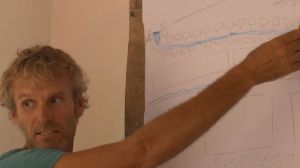 of water laden with countless tons of quality soil rush past the land on its way to the beach. My drawing shows it slowed against gabions, kept as high as possible for as long as possible, forced to drop its load, backed up and then diverted in swales along the contours, and finally into cisterns. I was deliberately mean with my green crayon but have nonetheless painted a very different scene to the reality outside this hot little room. They know I’m no expert. They’ve watched and no doubt laughed at Ayelen’s and my gardening efforts. But we too have known no better, planting fruit trees without support species, leaving the ground uncovered. What I’m talking about now is getting an expert down here and making a careful and detailed plan of terra-forming and planting.
of water laden with countless tons of quality soil rush past the land on its way to the beach. My drawing shows it slowed against gabions, kept as high as possible for as long as possible, forced to drop its load, backed up and then diverted in swales along the contours, and finally into cisterns. I was deliberately mean with my green crayon but have nonetheless painted a very different scene to the reality outside this hot little room. They know I’m no expert. They’ve watched and no doubt laughed at Ayelen’s and my gardening efforts. But we too have known no better, planting fruit trees without support species, leaving the ground uncovered. What I’m talking about now is getting an expert down here and making a careful and detailed plan of terra-forming and planting.
The reaction is better than I’d ever hoped for. To my surprise, nobody gives a damn about tearing down their drystone walls and carving great ditches everywhere. I have a whole page of annotated counter arguments to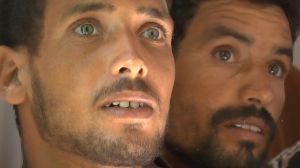 use, starting with the fact that their ancestors terra-formed this place when they arrived here but that things have changed since then and more needs doing now. None are necessary. They want to stay here and suddenly there’s a little more hope. I spend a lot of time pressing the point that I might fail to raise any money at all to help pay for such landscaping and what’s far more important is that they come together and work as a team. They must form a cooperative and become a taskforce with a clear economic goal or this is all just fantasy.
use, starting with the fact that their ancestors terra-formed this place when they arrived here but that things have changed since then and more needs doing now. None are necessary. They want to stay here and suddenly there’s a little more hope. I spend a lot of time pressing the point that I might fail to raise any money at all to help pay for such landscaping and what’s far more important is that they come together and work as a team. They must form a cooperative and become a taskforce with a clear economic goal or this is all just fantasy.
To finish, I outline one more, relatively new agricultural technique: aqua-ponics. I envisage the women in control of this, harvesting all their vegetable needs, and fish too, from a few greenhouses situated on the least productive land. All of this is possible; it just requires will and determination. I can see it in some faces (Hassan, 2nd from left below). Others give little away.
Once, shortly before working in Bosnia for the UN at the height of that war, I was taught a technique for reading 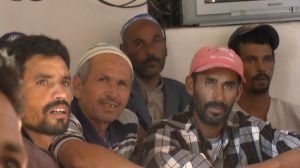 a man’s mind. By observing closely the flutter of his eyes as his brain processed the question just put to him and then what he might say in reply, one was supposed to be able to discern a lie from the truth. You had first to establish whether he was left or right handed, so cigarettes and things to sign were always up one’s sleeve. Then, while trying not to stare, you had to watch for the downward flick – processing the question – and then the upward – constructing the answer. Top right might indicate he was thinking up a lie, top left that you were getting the truth. Straight up, as in rolling heavenward with accompanying sigh, most likely indicated that he was bored and genuinely had no idea, but was going to bullshit you anyway. After a few days there it was fairly clear, from all sorts of other indications, that everyone was spinning us well thought out misinformation in any case, so I rather lost interest in mind reading.
a man’s mind. By observing closely the flutter of his eyes as his brain processed the question just put to him and then what he might say in reply, one was supposed to be able to discern a lie from the truth. You had first to establish whether he was left or right handed, so cigarettes and things to sign were always up one’s sleeve. Then, while trying not to stare, you had to watch for the downward flick – processing the question – and then the upward – constructing the answer. Top right might indicate he was thinking up a lie, top left that you were getting the truth. Straight up, as in rolling heavenward with accompanying sigh, most likely indicated that he was bored and genuinely had no idea, but was going to bullshit you anyway. After a few days there it was fairly clear, from all sorts of other indications, that everyone was spinning us well thought out misinformation in any case, so I rather lost interest in mind reading.
Nor would it serve me well here. Only time is going to tell me how hard these men will be prepared to fight to stay on this land. For now, all I need is majority consent, and for them to start the cooperative. Hassan tells me he’ll get around all those not present and give me the definitive answer in two days. This he does and all are in favour. He asks me to be the cooperative chairman. I explain there won’t be a chairman, they’ll be leading themselves democratically, but in reality I know I will indeed be the driving force, and for quite some time.
So, I have a new job. To start with, I’m a fund-raiser and then I have a blank canvas – 100 hectares of arable, 200 of forest – on which to experiment and trial the findings of the world’s leading perma-culturalists, agro-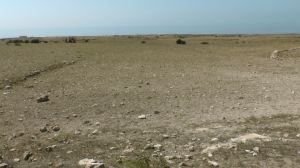 ecologists, holistic managers and anyone else with a good idea. It’s going to be a fascinating journey and it might even be the best job I’ve ever had.
ecologists, holistic managers and anyone else with a good idea. It’s going to be a fascinating journey and it might even be the best job I’ve ever had.
The day after my presentation, Abdullah, one of the brighter young men in the community, went to town and enrolled in an English language course. So it begins.


